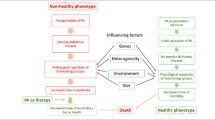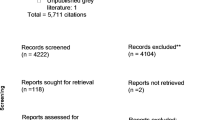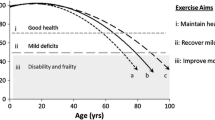Abstract
The aim of the present study was to examine adherence and acceptance of a home-based program to promote physical activity (PA) in older persons with cognitive impairment (CI) following inpatient rehabilitation. Sixty-three older persons (≥ 65 years) with mild to moderate CI (Mini-Mental State Examination score 17–26), allocated to the intervention group of a randomized, controlled intervention trial underwent a 12-week home-based PA intervention including (1) physical training and outdoor walking to improve functional fitness and (2) motivational strategies (goal-setting, pedometer-based self-monitoring, social support delivered by home visits, phone calls) to promote PA. Training logs were used to assess adherence to physical training, outdoor walking and to motivational strategies (goal-setting, pedometer-based self-monitoring). Acceptance (subjective feasibility and effectiveness) of the program components was assessed by a standardized questionnaire. Mean adherence rates over the intervention period were 63.6% for physical training, 57.9% for outdoor walking, and between 40.1% (achievement of walking goals), and 60.1% (pedometer-based self-monitoring) for motivational strategies. Adherence rates significantly declined from baseline to the end of intervention (T1: 43.4–76.8%, T2: 36.1–51.5%, p values<.019). Most participants rated physical training, outdoor walking, goal-setting, and pedometer self-monitoring as feasible (68.2–83.0%) and effective (63.5–78.3%). Highest ratings of self-perceived effectiveness were found for home visits (90.6%) and phone calls (79.2%). The moderate to high adherence to self-performed physical training and motivational strategies proved the feasibility of the home-based PA program in older persons with CI following inpatient rehabilitation.


Similar content being viewed by others
References
Abraham C, Michie S (2008) A taxonomy of behavior change techniques used in interventions. Health Psychol 27:379. https://doi.org/10.1037/0278-6133.27.3.379
Allgaier AK, Kramer D, Mergl R, Fejtkova S, Hegerl U (2011) Validity of the geriatric depression scale in nursing home residents: comparison of GDS-15, GDS-8, and GDS-4. Psychiatr Prax 38:280–286. https://doi.org/10.1055/s-0030-1266105
Bongartz M, Kiss R, Ullrich P, Eckert T, Bauer J, Hauer K (2017) Development of a home-based training program for post-ward geriatric rehabilitation patients with cognitive impairment: study protocol of a randomized-controlled trail. BMC Geriatr 17:214. https://doi.org/10.1186/s12877-017-0615-0
Brown CJ, Roth DL, Allman RM, Sawyer P, Ritchie CS, Roseman JM (2009) Trajectories of life-space mobility after hospitalization. Ann Intern Med 150:372–378. https://doi.org/10.7326/0003-4819-150-6-200903170-00005
Chenoweth L, Kable A, Pond D (2015) Research in hospital discharge procedures addresses gaps in care continuity in the community, but leaves gaping holes for people with dementia: a review of the literature. Australas J Ageing 34:9–14. https://doi.org/10.1111/ajag.12205
Clarke DE, Reekum R, Simard M, Streiner DL, Freedman M, Conn D (2007) Apathy in dementia: an examination of the psychometric properties of the apathy evaluation scale. J Neuropsychiatry Clin Neurosci 19:57–64. https://doi.org/10.1176/jnp.2007.19.1.57
Cox KL et al (2013) The FABS trial: a randomised control trial of the effects of a 6-month physical activity intervention on adherence and long-term physical activity and self-efficacy in older adults with memory complaints. Prev Med 57:824–830. https://doi.org/10.1016/j.ypmed.2013.09.010
Dannhauser TM, Cleverley M, Whitfield TJ, Fletcher BC, Stevens T, Walker Z (2014) A complex multimodal activity intervention to reduce the risk of dementia in mild cognitive impairment–ThinkingFit: pilot and feasibility study for a randomized controlled trial. BMC Psychiatry 14:129. https://doi.org/10.1186/1471-244x-14-129
David R et al (2012) Decreased daytime motor activity associated with apathy in Alzheimer disease: an actigraphic study. Am J Geriatr Psychiatry 20:806–814
Fairhall N, Sherrington C, Kurrle SE, Lord SR, Lockwood K, Cameron ID (2012) Effect of a multifactorial interdisciplinary intervention on mobility-related disability in frail older people: randomised controlled trial. BMC Med 10:120. https://doi.org/10.1186/1741-7015-10-120
Folstein MF, Folstein SE, McHugh PR (1975) Mini-mental state. A practical method for grading the cognitive state of patients for the clinician. J Psychiatr Res 12:189–198
Greenberg SA (2007) How to try this: the geriatric depression scale: short form. Am J Nurs 107:60–69; quiz 69–70. doi:10.1097/01.NAJ.0000292204.52313.f3
Guralnik JM et al (1994) A short physical performance battery assessing lower extremity function: association with self-reported disability and prediction of mortality and nursing home admission. J Gerontol 49:M85–M94
Harada K, Park H, Lee S, Shimada H, Yoshida D, Anan Y, Suzuki T (2017) Joint association of neighborhood environment and fear of falling on physical activity among frail older adults. J Aging Phys Act 25(1):140–148. https://doi.org/10.1123/japa.2016-0082
Hauer K, Schwenk M, Zieschang T, Essig M, Becker C, Oster P (2012) Physical training improves motor performance in people with dementia: a randomized controlled trial. J Am Geriatr Soc 60:8–15. https://doi.org/10.1111/j.1532-5415.2011.03778.x
Hauer K, Ullrich P, Dutzi I, Beurskens R, Kern S, Bauer J, Schwenk M (2017) Effects of standardized home training in patients with cognitive impairment following geriatric rehabilitation: a randomized controlled pilot study. Gerontology 63:495–506. https://doi.org/10.1159/000478263
Hawley-Hague H, Horne M, Skelton DA, Todd C (2016) Review of how we should define (and measure) adherence in studies examining older adults’ participation in exercise classes. BMJ Open 6:e011560. https://doi.org/10.1136/bmjopen-2016-011560
Heyn P, Abreu BC, Ottenbacher KJ (2004) The effects of exercise training on elderly persons with cognitive impairment and dementia: a meta-analysis. Arch Phys Med Rehabil 85:1694–1704
Jacus JP (2017) Awareness, apathy, and depression in Alzheimer’s disease and mild cognitive impairment. Brain Behav 7:e00661. https://doi.org/10.1002/brb3.661
Jansen CP, Classen K, Wahl HW, Hauer K (2015) Effects of interventions on physical activity in nursing home residents. Eur J Ageing 12:261–271. https://doi.org/10.1007/s10433-015-0344-1
Kerse N et al (2008) Does a functional activity programme improve function, quality of life, and falls for residents in long term care? Cluster randomised controlled trial. BMJ 337:a1445
Lautenschlager NT et al (2008) Effect of physical activity on cognitive function in older adults at risk for Alzheimer disease: a randomized trial. JAMA 300:1027–1037. https://doi.org/10.1001/jama.300.9.1027
Logsdon RG, McCurry SM, Pike KC, Teri L (2009) Making physical activity accessible to older adults with memory loss: a feasibility study. Gerontologist 49(Suppl 1):S94–S99. https://doi.org/10.1093/geront/gnp082
Lowery D et al (2014) The effect of exercise on behavioural and psychological symptoms of dementia: the EVIDEM-E randomised controlled clinical trial. Int J Geriatr Psychiatry 29:819–827. https://doi.org/10.1002/gps.4062
Marin RS, Biedrzycki RC, Firinciogullari S (1991) Reliability and validity of the Apathy Evaluation Scale. Psychiatry Res 38:143–162
Matz-Costa C, Howard EP, Castaneda-Sceppa C, Diaz-Valdes Iriarte A, Lachman ME (2019) Peer-based strategies to support physical activity interventions for older adults: A typology, conceptual framework, and practice guidelines. The Gerontologist 59(6):1007–1016. https://doi.org/10.1093/geront/gny092
McCurry SM, Gibbons LE, Logsdon RG, Vitiello MV, Teri L (2005) Nighttime insomnia treatment and education for Alzheimer’s disease: a randomized, controlled trial. J Am Geriatr Soc 53:793–802. https://doi.org/10.1111/j.1532-5415.2005.53252.x
McGilton KS, Chu CH, Naglie G, van Wyk PM, Stewart S, Davis AM (2016) Factors influencing outcomes of older adults after undergoing rehabilitation for hip fracture. J Am Geriatr Soc 64:1601–1609. https://doi.org/10.1111/jgs.14297
Moseley AM, Sherrington C, Lord SR, Barraclough E, St George RJ, Cameron ID (2009) Mobility training after hip fracture: a randomised controlled trial. Age Ageing 38:74–80. https://doi.org/10.1093/ageing/afn217
Murphy J, Tester S, Hubbard G, Downs M, MacDonald C (2005) Enabling frail older people with a communication difficulty to express their views: the use of talking mats as an interview tool. Health Soc Care Community 13:95–107. https://doi.org/10.1111/j.1365-2524.2005.00528.x
Najafi B, Aminian K, Paraschiv-Ionescu A, Loew F, Bula CJ, Robert P (2003) Ambulatory system for human motion analysis using a kinematic sensor: monitoring of daily physical activity in the elderly. IEEE Trans Biomed Eng 50:711–723. https://doi.org/10.1109/tbme.2003.812189
Notthoff N, Klomp P, Doerwald F, Scheibe S (2016) Positive messages enhance older adults’ motivation and recognition memory for physical activity programmes. Eur J Ageing 13:251–257. https://doi.org/10.1007/s10433-016-0368-1
Nyman SR, Adamczewska N, Howlett N (2018) Systematic review of behaviour change techniques to promote participation in physical activity among people with dementia. Br J Health Psycho 23:148–170. https://doi.org/10.1111/bjhp.12279
O’Bryant SE, Humphreys JD, Smith GE, Ivnik RJ, Graff-Radford NR, Petersen RC, Lucas JA (2008) Detecting dementia with the mini-mental state examination in highly educated individuals. Arch Neurol 65(7):963–967. https://doi.org/10.1001/archneur.65.7.963
Olsen CF, Telenius EW, Engedal K, Bergland A (2015) Increased self-efficacy: the experience of high-intensity exercise of nursing home residents with dementia—a qualitative study. BMC Health Serv Res. 15:379. https://doi.org/10.1186/s12913-015-1041-7
Phillips LJ, Flesner M (2013) Perspectives and experiences related to physical activity of elders in long-term-care settings. J Aging Phys Act 21:33–50
Portegijs E, Rantakokko M, Mikkola TM, Viljanen A, Rantanen T (2014) Association between physical performance and sense of autonomy in outdoor activities and life-space mobility in community-dwelling older people. J Am Geriatr Soc 62:615–621. https://doi.org/10.1111/jgs.12763
Poulsen T, Elkjaer E, Vass M, Hendriksen C, Avlund K (2007) Promoting physical activity in older adults by education of home visitors. Eur J Ageing 4:115–124. https://doi.org/10.1007/s10433-007-0057-1
Prick A-E, de Lange J, Scherder E, Twisk J, Pot AM (2016) The effects of a multicomponent dyadic intervention on the mood, behavior, and physical health of people with dementia: a randomized controlled trial. Clin Interv Aging 11:383. https://doi.org/10.2147/cia.s95789
Rosenberg DE, Kerr J, Sallis JF, Norman GJ, Calfas K, Patrick K (2012) Promoting walking among older adults living in retirement communities. J Aging Phys Act 20:379–394
Salpakoski A et al (2014) Effects of a multicomponent home-based physical rehabilitation program on mobility recovery after hip fracture: a randomized controlled trial. J Am Med Dir Assoc 15:361–368. https://doi.org/10.1016/j.jamda.2013.12.083
Smit EB, Bouwstra H, van der Wouden JC, Wattel LM, Hertogh CM (2018) Patient-centred goal setting using functional outcome measures in geriatric rehabilitation: is it feasible? Eur Geriatr Med 9:71–76. https://doi.org/10.1007/s41999-017-0011-5
Smit EB, Bouwstra H, Hertogh CM, Wattel EM, van der Wouden JC (2019) Goal-setting in geriatric rehabilitation: a systematic review and meta-analysis. Clin Rehabil 33:395–407. https://doi.org/10.1177/0269215518818224
Stevens A, Beurskens A, Köke A, van der Weijden T (2013) The use of patient-specific measurement instruments in the process of goal-setting: a systematic review of available instruments and their feasibility. Clin Rehabil 27(11):1005–1019. https://doi.org/10.1177/0269215513490178
Suttanon P, Hill KD, Said CM, Byrne KN, Dodd KJ (2012) Factors influencing commencement and adherence to a home-based balance exercise program for reducing risk of falls: perceptions of people with Alzheimer’s disease and their caregivers. Int Psychogeriatr 24:1172–1182. https://doi.org/10.1017/s1041610211002729
Suttanon P et al (2013) Feasibility, safety and preliminary evidence of the effectiveness of a home-based exercise programme for older people with Alzheimer’s disease: a pilot randomized controlled trial. Clin Rehabil 27:427–438. https://doi.org/10.1177/0269215512460877
Taylor ME et al (2017) A home-based, carer-enhanced exercise program improves balance and falls efficacy in community-dwelling older people with dementia. Int Psychogeriatr 29:81–91
Teri L et al (2003) Exercise plus behavioral management in patients with Alzheimer disease: a randomized controlled trial. JAMA 290:2015–2022
Tortosa-Martínez J, Beltrán-Carrillo VJ, Caus N, Iglesias-Martínez MJ, Lozano-Cabezas I, Jimenez-Hernández S, Cortell-Tormo J (2017) Psychosocial benefits of exercise for older adults with amnestic mild cognitive impairment: innovative practice. Dementia:1471301217725895
van der Wardt V, Hancox J, Gondek D, Logan P, Nair RD, Pollock K, Harwood R (2017) Adherence support strategies for exercise interventions in people with mild cognitive impairment and dementia: a systematic review Prev Med Rep 7:38–45. https://doi.org/10.1016/j.pmedr.2017.05.007
van Seben R, Smorenburg SM, Buurman BM (2019) A qualitative study of patient-centered goal-setting in geriatric rehabilitation: patient and professional perspectives. Clin Rehabil 33:128–140
Vidoni ED et al (2016) Feasibility of a memory clinic-based physical activity prescription program. J Alzheimer’s Disease: JAD 53:161–170. https://doi.org/10.3233/jad-160158
Visser M, Brychta RJ, Chen KY, Koster A (2014) Self-reported adherence to the physical activity recommendation and determinants of misperception in older adults. J Aging Phys Act 22(2):226–234. https://doi.org/10.1123/japa.2012-0219
Wesson J, Clemson L, Brodaty H, Lord S, Taylor M, Gitlin L, Close J (2013) A feasibility study and pilot randomised trial of a tailored prevention program to reduce falls in older people with mild dementia. BMC Geriatr 13:89. https://doi.org/10.1186/1471-2318-13-89
Yuenyongchaiwat K, Pongpanit K, Hanmanop S (2018) Physical activity and depression in older adults with and without cognitive impairment. Dement Neuropsychol 12(1):12–18. https://doi.org/10.1590/1980-57642018dn12-010002
Acknowledgments
This work was funded by the Social and Private Long-Term Care Insurance (Soziale und Private Pflegeversicherung) and the Municipal Association for Youth and Social Affairs in Baden-Württemberg (Kommunalverband für Jugend und Soziales Baden-Württemberg) (Grant No: 80221-208-009-01-01). Funders had no role in study concept and design, data collection, analysis and interpretation, and preparation of the manuscript.
Author information
Authors and Affiliations
Corresponding author
Ethics declarations
Conflicts of interest
The authors have no conflicts of interest to declare.
Additional information
Publisher's Note
Springer Nature remains neutral with regard to jurisdictional claims in published maps and institutional affiliations.
Responsible editor: Matthias Kliegel.
Rights and permissions
About this article
Cite this article
Eckert, T., Bongartz, M., Ullrich, P. et al. Promoting physical activity in geriatric patients with cognitive impairment after discharge from ward-rehabilitation: a feasibility study. Eur J Ageing 17, 309–320 (2020). https://doi.org/10.1007/s10433-020-00555-w
Published:
Issue Date:
DOI: https://doi.org/10.1007/s10433-020-00555-w




